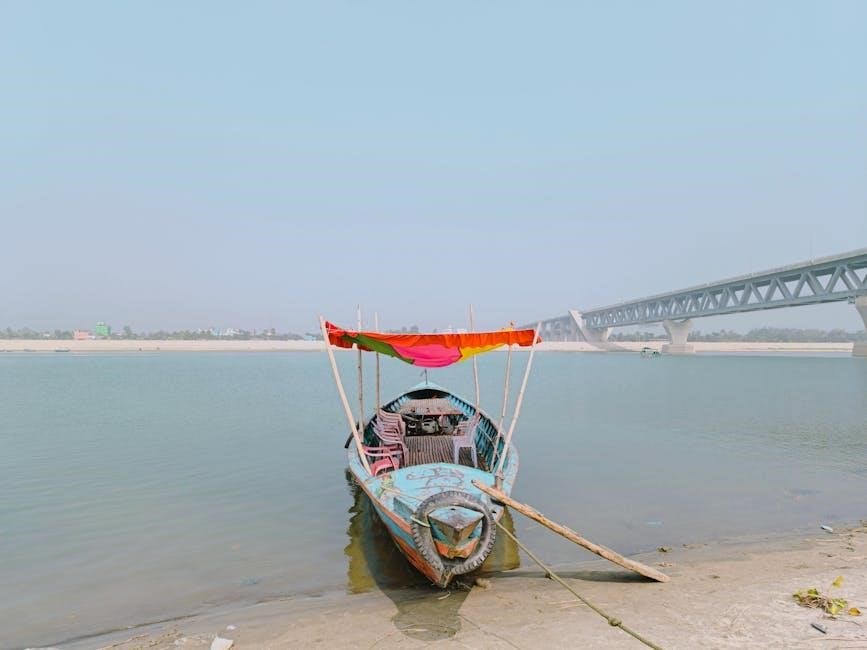Homer’s Odyssey, translated by Robert Fagles, is a timeless epic of adventure and human resilience․ Fagles’ poetic yet accessible rendition brings ancient Greece to modern readers, while the PDF format enhances study with line numbers and easy accessibility, making it a vital resource for scholars and enthusiasts alike․
1․1 Overview of Homer’s “The Odyssey”
Homer’s Odyssey is an ancient Greek epic poem that recounts the journey of Odysseus, a king of Ithaca, as he navigates his perilous return home after the Trojan War․ The epic explores themes of homecoming, identity, and morality, weaving a narrative rich in adventure, divine intervention, and human struggle․ Odysseus’s encounters with mythical creatures and challenges test his wit, courage, and loyalty, while his wife, Penelope, resists suitors vying for her hand in his absence․ The poem’s structure, divided into 24 books, masterfully blends storytelling with deeper philosophical reflections․ Robert Fagles’ translation captures the poetic essence of Homer’s original, making the ancient tale accessible to modern readers while preserving its timeless appeal․
1․2 The Significance of Robert Fagles’ Translation
Robert Fagles’ translation of The Odyssey is celebrated for its poetic yet accessible language, bridging the gap between ancient and modern audiences․ His work maintains the epic’s grandeur while ensuring readability, making Homer’s masterpiece approachable for both scholars and general readers․ Fagles’ dynamic and vibrant prose captures the original’s emotional depth and narrative flow, earning widespread acclaim․ His translation is particularly noted for its balance of scholarly accuracy and poetic beauty, ensuring the timeless themes of the epic resonate with contemporary readers․ The availability of his translation in PDF format further enhances its accessibility, providing a convenient and searchable resource for study and enjoyment․
1․3 The Importance of the PDF Format for Modern Readers
The PDF format of Robert Fagles’ translation of The Odyssey offers unparalleled convenience and accessibility for modern readers․ This digital version allows for easy navigation, with features like search functionality and adjustable font sizes, enhancing the reading experience․ The inclusion of line numbers in the PDF is particularly valuable for academic purposes, enabling precise reference and analysis․ Additionally, the portability of the PDF file makes it ideal for reading on various devices, catering to the needs of both students and enthusiasts․ This format ensures that Fagles’ masterful translation reaches a broader audience while preserving the integrity and poetic beauty of Homer’s original work․
Background on Homer and “The Odyssey”
Homer, a cornerstone of ancient Greek literature, crafted The Odyssey, an epic tale of Odysseus’ journey, exploring themes of heroism and human struggle, uniquely captured in Robert Fagles’ translation, ensuring accessibility for modern readers․
2․1 Homer’s Role in Ancient Greek Literature
Homer stands as a foundational figure in ancient Greek literature, celebrated for his epic poems, The Iliad and The Odyssey․ These works are cornerstone narratives, shaping themes of heroism, morality, and human struggle․ Homer’s poetry is renowned for its rich imagery, complex characters, and exploration of universal themes․ His epics have profoundly influenced Western literature, establishing archetypes for storytelling․ The Odyssey, in particular, captures the essence of human resilience through Odysseus’ journey, making Homer a timeless literary giant․ His works remain central to classical studies, ensuring his enduring legacy․ The availability of Robert Fagles’ PDF translation has further cemented Homer’s relevance for modern readers․
2․2 The Historical Context of “The Odyssey”
The Odyssey is set in the late Bronze Age, reflecting the societal norms and political structures of ancient Greece․ Composed around 800–700 BCE, it captures the post-Trojan War era, exploring themes of homecoming and reintegration into society․ The epic embodies the oral tradition of storytelling, with its episodic structure and use of formulas, which were vital for memorization and performance․ Homer’s work reflects the values of a hierarchical society, emphasizing the role of kings, the influence of the gods, and the struggles of common people․ This historical backdrop enriches the narrative, offering insights into the culture and beliefs of ancient Greece, while Robert Fagles’ translation preserves these timeless themes for modern readers․
2․3 The Epic’s Structure and Key Themes
The Odyssey is structured into 24 books, blending Telemachy (Odysseus’s son’s journey) with the hero’s own narrative of return․ Central themes include homecoming, identity, and morality, explored through Odysseus’s trials and societal expectations․ The epic uses poetic devices like metaphors and similes to enrich its storytelling․ Themes of loyalty, cunning, and divine intervention highlight the complexities of human and divine relationships․ Odysseus’s journey symbolizes the universal struggle between fate and personal agency, resonating deeply with readers․ Robert Fagles’ translation masterfully captures these elements, ensuring the epic’s timeless appeal endures in modern interpretations, while the PDF format enhances accessibility for scholarly and personal exploration․

Robert Fagles and His Translation Style
Robert Fagles’ translation of The Odyssey is renowned for its poetic yet accessible language, balancing scholarly precision with readability․ His lyrical prose preserves the epic’s grandeur while connecting with modern readers, making the PDF version a cherished resource for both study and enjoyment․
3․1 Biographical Sketch of Robert Fagles
Robert Fagles was a renowned American professor, poet, and translator, best known for his evocative translations of ancient Greek and Roman classics․ Born in 1933, Fagles was a distinguished scholar who taught at Yale and Princeton universities․ His work on Homer’s epics, particularly The Iliad and The Odyssey, earned him widespread acclaim for blending poetic grace with scholarly fidelity․ Fagles’ translations are celebrated for their readability and emotional depth, making ancient texts accessible to modern audiences․ His collaboration with classicist Bernard Knox further enriched his translations, ensuring both accuracy and literary brilliance․ Fagles’ legacy endures as a bridge between ancient and contemporary literature․
3․2 Fagles’ Approach to Translating Ancient Texts
Robert Fagles approached translation with a balance of scholarly precision and poetic flair, ensuring ancient texts retained their original essence while becoming accessible to modern readers․ He emphasized maintaining the emotional and narrative depth of Homer’s works, using lyrical language to capture the epic’s grandeur․ Fagles’ translations are noted for their fluidity and readability, making complex ancient Greek poetry relatable without sacrificing its intellectual or artistic integrity․ His collaboration with classicist Bernard Knox added historical and cultural context, enhancing the translations’ depth․ Fagles’ dynamic style ensured the texts remained vivid and engaging, bridging the gap between antiquity and contemporary readers․
3․3 The Use of Poetic Language in the Translation
Robert Fagles employed poetic language to preserve the lyrical essence of Homers original text while making it accessible to modern readers․ His translation captures the epic’s rhythmic flow and emotional depth through a dynamic, free-verse style․ Fagles avoided rigid meter, opting instead for a natural, expressive cadence that retains the ancient poems grandeur․ His use of vivid imagery and evocative phrasing ensures the narrative remains engaging and relatable; This poetic approach balances artistic fidelity with readability, allowing the timeless themes of The Odyssey to resonate with contemporary audiences․ Fagles’ lyrical prose not only honors Homer’s vision but also enhances the reading experience, making the epic feel both classic and fresh․
Key Features of the Odyssey
The Odyssey captivates with Odysseus’s perilous journey, divine interventions, and themes of homecoming, identity, and morality, blending adventure with profound insights into human nature and destiny․
4․1 The Journey of Odysseus: A Hero’s Quest
Odysseus’s journey in The Odyssey is a quintessential hero’s quest, marked by resilience, wit, and the unyielding desire to return home․ After the Trojan War, Odysseus faces divine wrath, natural disasters, and mythical creatures, testing his cunning and strength․ His reliance on intelligence over brute force highlights his unique character, as he navigates challenges like the Cyclops, Sirens, and whirlpools; The epic chronicles his physical and emotional trials, transforming him into a symbol of perseverance․ Fagles’ translation captures the depth of Odysseus’s struggles, making his quest a universal tale of human determination and the enduring hope of reunification with one’s homeland and identity;
4․2 The Role of the Gods in the Epic
The gods in The Odyssey play a pivotal role, shaping Odysseus’s fate and the epic’s outcome․ Athena, as Odysseus’s steadfast protector, intervenes repeatedly, while Poseidon’s wrath prolongs his suffering․ Zeus’s authority balances divine interference, ensuring justice and order․ The gods’ involvement highlights the interplay between fate and human agency, adding depth to Odysseus’s journey․ Fagles’ translation vividly portrays these divine interactions, making the epic’s supernatural elements resonate with modern readers․ The gods’ influence not only drives the plot but also underscores the themes of morality and destiny, enriching the narrative’s timeless appeal․
4․3 Themes of Homecoming, Identity, and Morality
The Odyssey explores universal themes of homecoming, identity, and morality through Odysseus’s perilous journey․ Homecoming symbolizes a return to origins, as Odysseus battles to reclaim his kingdom and family, emphasizing the importance of roots and belonging․ Identity is central to his quest, as he navigates disguises and challenges, ultimately reaffirming his character and purpose․ Morality is tested through his trials and the consequences of others’ actions, such as the suitors’ downfall, highlighting justice and accountability․ Fagles’ translation masterfully conveys these themes, making the epic resonate with modern readers while preserving its ancient wisdom and depth․ These themes remain timeless, offering insights into human nature and society․
The Translation Process and Challenges
Fagles faced challenges in preserving the poetic essence of Homer’s work while ensuring readability․ His collaboration with Bernard Knox added scholarly depth, balancing accuracy with accessibility for modern readers․
5․1 Maintaining the Original’s Poetic Integrity
Robert Fagles meticulously preserved the poetic essence of Homer’s Odyssey while translating․ His lyrical language and rhythmic flow honor the original’s grandeur․ The PDF format ensures that this integrity remains intact for digital readers, blending artistry with accessibility․ Fagles’ approach captivates modern readers without compromising the epic’s timeless beauty, making the translation both scholarly and engaging․
5․2 Balancing Scholarly Accuracy with Readability
Fagles’ translation of The Odyssey masterfully blends academic fidelity with reader-friendly prose․ His clear, engaging language makes the epic accessible without sacrificing its intellectual depth․ The PDF format’s features, such as line numbers, aid scholars while ensuring the text remains approachable for casual readers․ This balance has made Fagles’ work a preferred choice for both classrooms and personal reading, proving that ancient literature can resonate with modern audiences effectively․
5․3 The Collaboration with Bernard Knox
Robert Fagles’ translation of The Odyssey was enriched by his collaboration with Bernard Knox, a renowned classicist․ Knox’s introductions and notes provided historical and cultural context, enhancing the reader’s understanding of Homer’s epic․ The PDF edition seamlessly integrates Knox’s insights, offering a comprehensive reading experience․ This partnership ensured that the translation remained both scholarly and accessible, bridging the gap between academic rigor and reader engagement․ Their combined efforts have made the PDF version a invaluable resource for students and scholars, fostering a deeper appreciation of Homer’s masterpiece․

The Reception of Fagles’ Translation
Robert Fagles’ translation of The Odyssey received widespread critical acclaim for its poetic yet accessible language․ Readers praised its smooth narrative flow, making the PDF a popular choice among scholars and enthusiasts alike․
6․1 Critical Acclaim and Scholarly Reviews
Robert Fagles’ translation of The Odyssey garnered widespread critical acclaim for its poetic and dynamic rendering of Homer’s classic․ Scholars lauded Fagles’ ability to balance scholarly accuracy with readability, making the epic accessible to a broad audience․ Reviewers noted the translation’s lyrical quality, which preserved the original’s grandeur while engaging modern readers․ The collaboration with Bernard Knox added depth, with his introductions and notes providing invaluable context․ The PDF version, particularly the Penguin Classics Deluxe Edition, was praised for its clarity and ease of navigation, making it a preferred resource for both academic and casual readers․ Fagles’ work is celebrated for revitalizing interest in classical literature․
6․2 Reader Feedback and Popularity
Readers widely praised Robert Fagles’ translation of The Odyssey for its readability and poetic charm․ Many found it easier to engage with the epic due to its accessible language while maintaining the original’s grandeur․ The PDF version, especially the Penguin Classics Deluxe Edition, became popular for its clear formatting and ease of navigation․ Students and enthusiasts appreciated the inclusion of line numbers, making it ideal for study and reference․ Fagles’ work resonated with a broad audience, bridging the gap between scholarly accuracy and enjoyable reading․ Its popularity endures as a go-to translation for both academic and casual readers of classical literature․
6․3 Comparisons with Other Translations
Robert Fagles’ translation of The Odyssey is often compared to other notable translations, such as Richmond Lattimore’s literal approach or Emily Wilson’s feminist perspective․ Fagles’ version is praised for its poetic vibrancy and accessibility, making it a favorite among readers seeking both scholarly fidelity and readability․ While some prefer the strict accuracy of Lattimore, others appreciate Fagles’ dynamic storytelling․ The PDF edition of his translation is particularly popular for its clarity and ease of use, further enhancing its appeal․ Fagles’ work is widely regarded as a balanced and engaging interpretation, ensuring its enduring popularity alongside other esteemed translations of the epic․

The PDF Version of “The Odyssey”
The PDF version of The Odyssey offers unparalleled accessibility, featuring line numbers for easy reference and study, enhancing readability while preserving the poetic essence of Fagles’ translation․
7․1 Availability and Accessibility
The PDF version of The Odyssey translated by Robert Fagles is widely available online, ensuring easy access for readers worldwide․ Platforms like the Internet Archive and academic repositories offer free downloads, making it convenient for students and scholars to obtain the text․ The digital format is compatible with various devices, allowing readers to engage with the epic on desktops, tablets, or mobile devices․ Additionally, the PDF includes features like line numbers, which are essential for academic referencing and analysis․ This accessibility has made Fagles’ translation a popular choice for both casual readers and educational institutions, fostering a deeper connection with Homer’s timeless work․
7․2 Features of the Digital Edition
The digital edition of The Odyssey in PDF format, translated by Robert Fagles, offers several convenient features․ It includes line numbers, which are essential for scholarly analysis and referencing․ The text is searchable, allowing readers to quickly locate specific passages or themes․ Bookmarks and a table of contents enable easy navigation through the epic’s 24 books․ The PDF is also readable on multiple devices, ensuring accessibility; Additionally, the digital version retains the poetic integrity of Fagles’ translation while maintaining clear typography and proper spacing, making it both visually appealing and functional for study or leisure reading․
7․3 Benefits of the PDF Format for Study
The PDF format of Robert Fagles’ translation of The Odyssey offers numerous benefits for study․ It provides a consistent layout and pagination, essential for referencing and note-taking․ Line numbers are included, facilitating textual analysis and citation․ The file is portable, allowing students to access the text on multiple devices without losing their place․ Search functionality enables quick access to specific passages, while bookmarks and a table of contents simplify navigation․ The PDF format also ensures that the poetic structure and formatting of Fagles’ translation remain intact, preserving the literary experience․ This makes it an invaluable resource for both academic and personal study․

Educational and Scholarly Use
The PDF of Robert Fagles’ Odyssey is widely used in academic settings, offering line numbers and study guides that aid in scholarly analysis․ Its accessibility supports both teaching and research․
8․1 Incorporation into Academic Curricula
Robert Fagles’ translation of The Odyssey is widely incorporated into academic curricula due to its poetic yet accessible language․ The PDF version, featuring line numbers, is particularly valued for its ease of reference in classroom discussions and scholarly analyses․ Educators often include it in syllabi for courses on classical literature, mythology, and ancient Greek studies․ The translation’s clarity and fidelity to Homer’s original work make it an ideal resource for both undergraduate and graduate-level studies․ Additionally, the digital format allows for easy distribution and accessibility, enhancing the learning experience for students worldwide․
8․2 Study Guides and Resources
Study guides and resources accompanying Robert Fagles’ PDF translation of The Odyssey are invaluable for academic analysis․ The digital format includes line numbers, facilitating precise references during scholarly discussions․ Supplementary materials, such as reading schedules and thematic analyses, enhance comprehension for students․ Resources like the Chicago Homer database offer additional tools for cross-referencing the original Greek text․ These resources collectively support a deeper understanding of the epic, making it easier for educators and students to integrate the PDF into their curriculum․ The availability of these study aids ensures that Fagles’ translation remains a cornerstone of classical literature education․
8․3 The Role of Line Numbers in Analysis
Line numbers in the Robert Fagles PDF translation of The Odyssey are essential for scholarly analysis․ They enable precise referencing of specific passages, facilitating detailed discussions of themes, characters, and poetic devices․ This feature is particularly valuable for students and researchers, as it allows for accurate citations and comparisons․ The inclusion of line numbers also aids in tracking the narrative’s progression, making it easier to analyze Odysseus’ journey and key events․ For educators, this tool enhances lesson planning and assignments, ensuring a unified approach to studying the text․ The clarity and accessibility provided by line numbers make the PDF a robust resource for both academic and personal study․

The Impact of Fagles’ Translation on Modern Literature
Robert Fagles’ translation of The Odyssey has inspired contemporary translators and popularized classical literature, ensuring its relevance in modern times through poetic and accessible language․
9․1 Influence on Contemporary Translations
Robert Fagles’ translation of The Odyssey has set a new standard for contemporary translations of classical texts․ His dynamic and vibrant style, blending poetic grace with readability, has inspired many translators to adopt a similar approach․ Fagles’ ability to maintain the epic’s original essence while making it accessible to modern readers has influenced a generation of scholars and translators․ His work has encouraged a shift toward more engaging and lyrical translations, ensuring that ancient literature remains relevant and captivating for today’s audience․ This influence is evident in the proliferation of fresh, lively translations of classical works in recent years․
9․2 Popularizing Classical Literature
Robert Fagles’ translation of The Odyssey has played a pivotal role in popularizing classical literature for modern readers․ His lyrical and accessible prose has bridged the gap between ancient Greek epics and contemporary audiences, making Homer’s work relatable and engaging․ The PDF format further enhances accessibility, allowing readers to easily explore the text digitally․ Fagles’ approach has inspired a new wave of interest in classical literature, proving that ancient stories retain their power to captivate․ His translation has also been widely adopted in educational settings, introducing countless students to the richness of The Odyssey and fostering a deeper appreciation for classical works․
9․3 Ensuring the Legacy of “The Odyssey”
Robert Fagles’ translation of The Odyssey has cemented the epic’s legacy, ensuring its enduring relevance in modern times․ The PDF version, with its scholarly accuracy and poetic beauty, provides a timeless resource for future generations․ Fagles’ work has made Homer’s masterpiece accessible to a broad audience, preserving its cultural and literary significance․ His translation not only honors the original text but also introduces it to new readers, guaranteeing that The Odyssey remains a cornerstone of Western literature․ The digital format further secures its place, allowing the epic to thrive in an ever-evolving world, where classical works continue to inspire and educate․
Homer’s Odyssey, masterfully translated by Robert Fagles, remains a timeless tale of resilience and humanity․ The PDF format ensures its legacy, offering modern readers accessible, poetic brilliance while preserving its enduring relevance for future generations․
10․1 The Enduring Appeal of “The Odyssey”
The Odyssey captivates readers with its timeless themes of resilience, wit, and the universal human quest for home․ Odysseus’s journey, rich in epic battles, divine interventions, and moral dilemmas, resonates across generations․ Its exploration of identity, loyalty, and survival continues to inspire modern audiences․ Robert Fagles’ translation preserves the poetic brilliance while enhancing accessibility, making the ancient epic relatable․ The PDF format ensures easy access, allowing scholars and readers to engage deeply with the text․ As a foundational work of Western literature, The Odyssey endures, offering insights into human nature and the complexities of life’s journey․
10․2 The Contribution of Robert Fagles
Robert Fagles has left an indelible mark on classical literature through his masterful translation of The Odyssey․ His work bridges the gap between ancient Greek poetry and modern readers, ensuring the epic’s accessibility without compromising its poetic integrity․ Fagles’ lyrical language and balanced approach have made The Odyssey a beloved text for both scholars and general readers․ The PDF version of his translation further enhances its reach, providing a convenient format for study and appreciation․ Fagles’ contribution not only revitalizes Homer’s masterpiece but also ensures its enduring legacy in contemporary literature, making ancient wisdom and artistry available to future generations․ His translation remains a cornerstone of classical studies and literary appreciation․
10․3 The Future of Digital Classics
The rise of digital formats like PDF is revolutionizing access to classical works such as The Odyssey․ Robert Fagles’ translation, available in digital editions, ensures that Homer’s epic reaches a global audience with ease․ Features like line numbers, searchable text, and portability make studying and referencing simpler․ Digital classics also enable interactive learning tools, enhancing engagement for modern readers․ Collaborations between scholars and digital platforms further enrich these resources, blending tradition with innovation․ As technology evolves, digital classics will continue to preserve and promote ancient literature, ensuring works like The Odyssey remain relevant and accessible for future generations․ This seamless integration of tradition and modernity guarantees the enduring legacy of classical texts․
